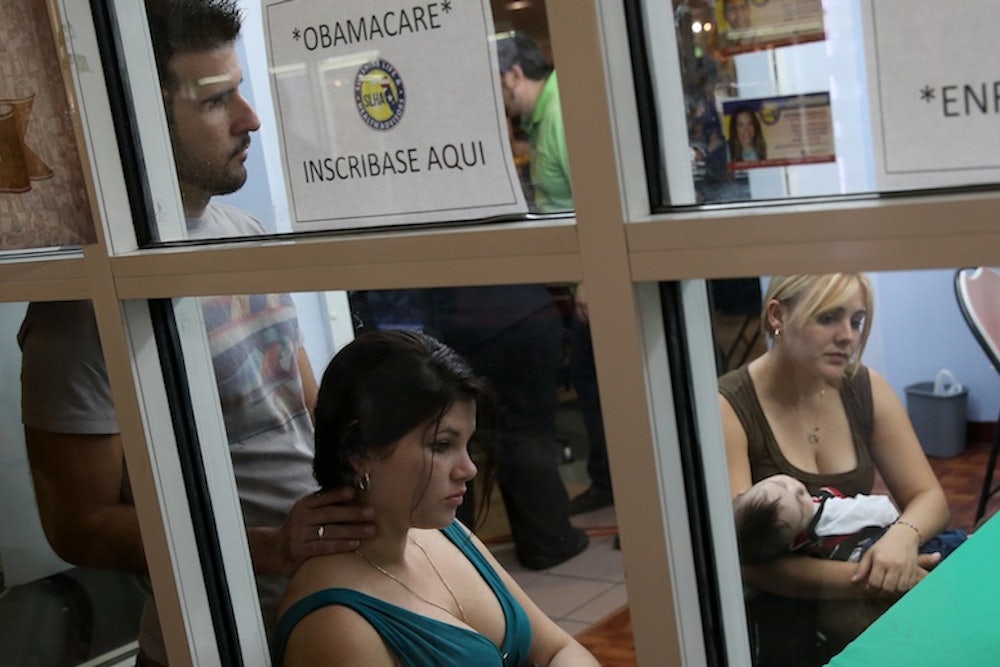The individual mandate has always been among Obamacare’s most unpopular features. But the latest Republican effort to attack it just ran into trouble, for reasons that ought to give Democrats a little confidence—along with a little pause.
The mandate is the requirement that Americans who fail to get insurance pay a penalty. It has survived both efforts to repeal it through Congress and, more famously, an attempt to repeal it through the courts. The Republicans’ latest gambit is to propose a five-year delay, which would save the government money, and then use those funds to offset the cost of a “doc fix”—a measure to spare physicians looming cuts in Medicare reimbursements.
It’s a new and clever way to package an effort to undermine the mandate—and, through it, the law. But, of course, it has consequences. According to the Congressional Budget Office, which released an analysis of the proposal on Wednesday, pushing back the mandate by five years would mean about 13 million fewer people would have health insurance, while premiums for those buying coverage would be 10 to 20 percent higher than they would be if the mandate remained in place. The estimates were for 2018 but, CBO said, the results would be similar for each of the previous years.
The conclusion was no surprise at all. Experts believe, based on data from past insurance expansions, that the threat of fines encourages people to sign up for insurance—in particular, younger and healthier people who might not otherwise get coverage. That reduces premiums for everybody else with coverage. CBO’s newest estimate was consistent with what it’s said in the past. And, as Edwin Park of the Center on Budget and Policy Priorities points out, the projection is pretty similar to what other respected analysts—like those at the Rand Corporation and Urban Institute—have estimated would happen if the mandate went away.
But this time the CBO projection has different, more concrete implications. The law is no longer hypothetical. Several million people are already getting insurance from the program. It’s their premiums that will rise if the mandate doesn’t take effect.
Some of these people are already substantially paying higher premiums, because their old plans didn’t live up to the law’s standards, and it’s likely many of them won’t really care what the CBO says. They’re mad at the Democrats and will stay that way for a while. But a bunch of other people—the majority, according to the best estimates I’ve seen—are paying less or getting coverage for the first time. The Republican proposal would hit them directly. And while getting that message across isn’t easy, voters who benefit from the law right now are likely to be more sympathetic to the Democrats—and, inevitably, skeptical of Republicans who have made very clear their interest in repealing it altogether. This has always been the great Republican fear, and the great Democratic hope: That, over time, the benefits of the law would make it impossible to dislodge.
The CBO report does raise one awkward question for Democrats. The law includes a “hardship waiver,” which allows people to avoid paying the fine if buying affordable insurance would be difficult. And the Obama Administration has made clear it intends to interpret that provision broadly, to the point that avoiding the mandate next year should be easy. Legally that’s probably fine. And allowing lots of exemptions, at least early on, has certain logic to it. With a big program like this, slow, gradual transitions make sense. Massachusetts had plenty of exemptions when it introduced its version of reform.
But if the mandate is as important as CBO and the experts say, then at some point it needs to become a real and potent threat—more than it would seem to be right now. Otherwise, it won’t do much good and Obamacare’s enrollment numbers could look as bad as those from the Republican replacement bill.
